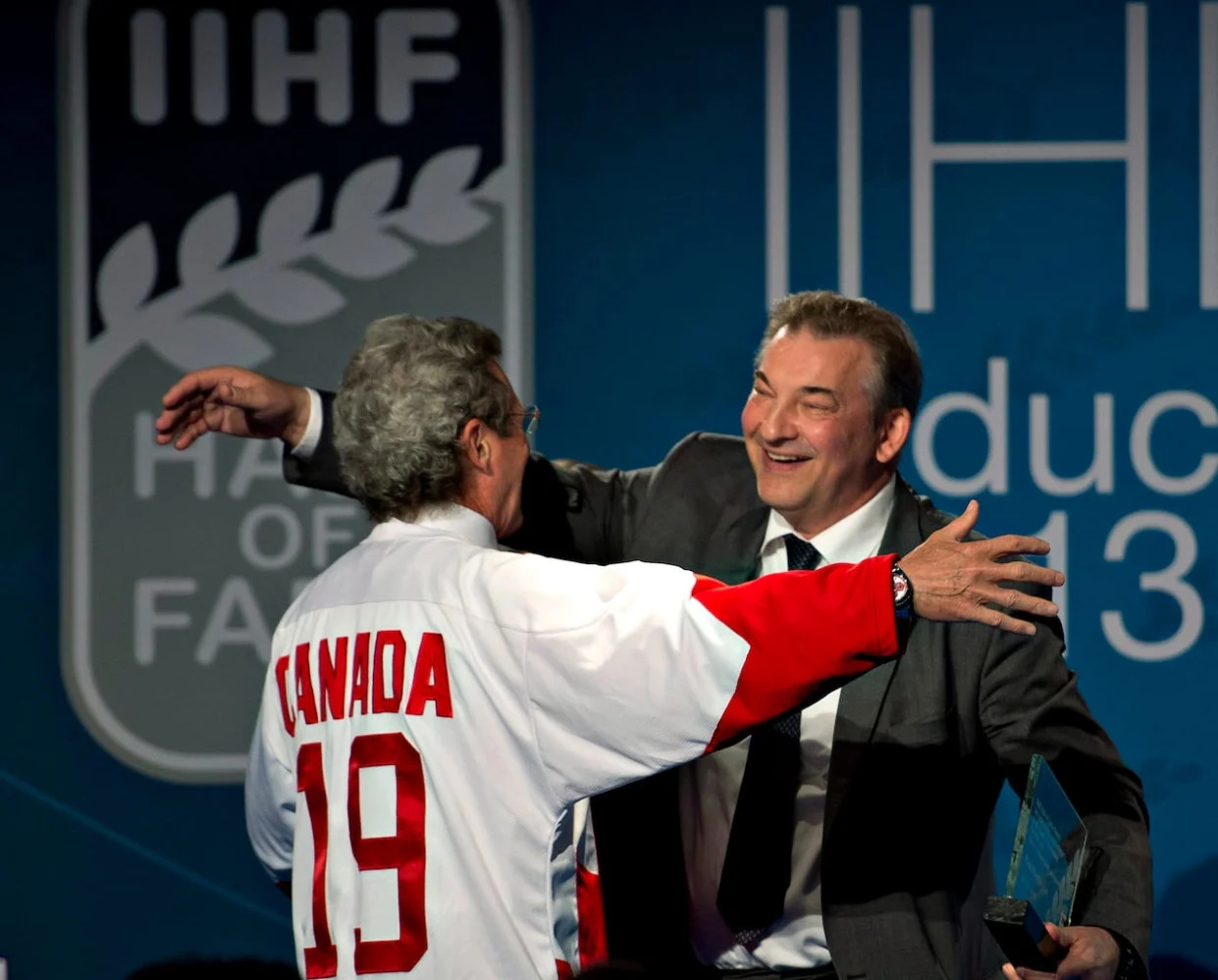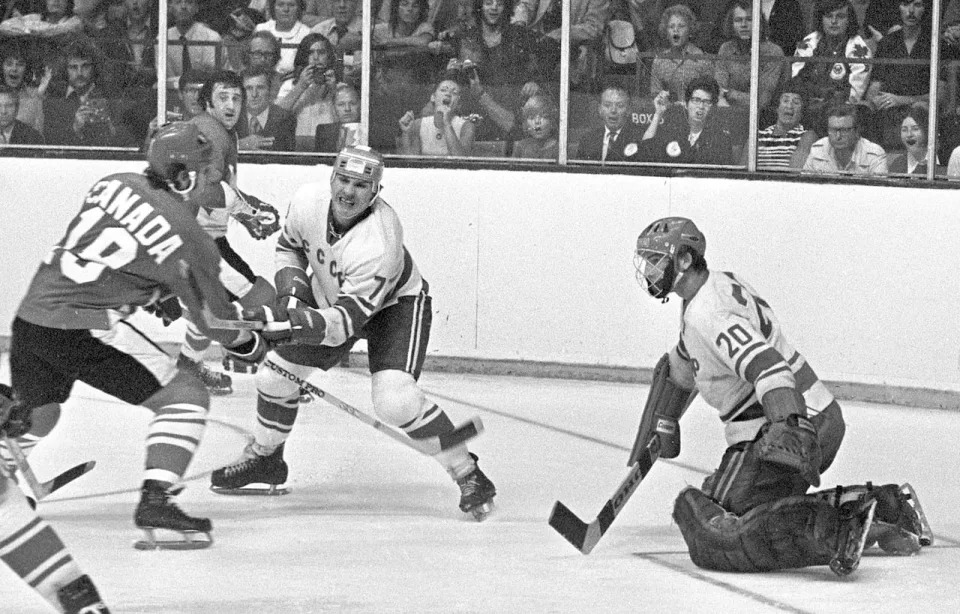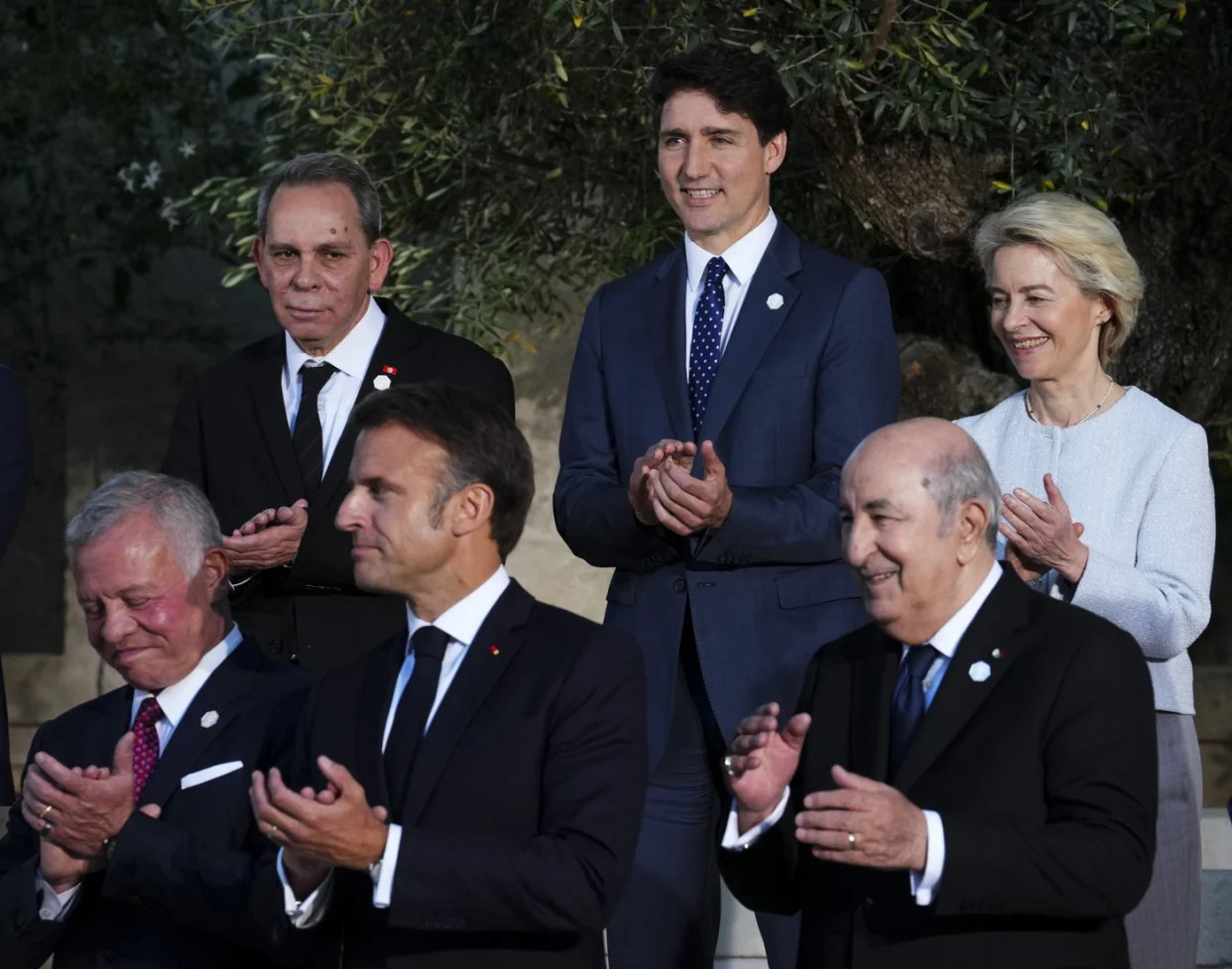CBC
Thu, June 13, 2024

1972 Team Canada's Paul Henderson is greeted by 1972 Soviet team goalkeeper Vladislav Tretiak as he is inducted at the IIHF Hall of Fame at the world hockey championship in Stockholm, Sweden on Sunday, May 19, 2013. (Jacques Boissinot/The Canadian Press - image credit)
Canada has levelled sanctions against an icon of the 1972 Summit Series between Canada and the Soviet Union.
Vladislav Tretiak — the goaltender for the Soviet Union in the 1972 series against Canada that captivated hockey fans in both countries — is among 11 people sanctioned by the federal government over Russia's ongoing war on Ukraine.
Prime Minister Justin Trudeau's office announced the new sanctions package on Thursday during the G7 summit in Italy. The war in Ukraine is a major topic on the G7 agenda.
The sanctions target 11 people and 16 entities who "supply key technology and electrical components in support of Russia's war of aggression," the Prime Minister's Office said in a news release.
The sanctions also target individuals and entities "implicated in disinformation and propaganda operations," the news release said.
"Today's newest sanctions reflect our long-standing efforts to disrupt [Russian President Vladimir] Putin's ability to wage Russia's illegal war, including by conducting gross disinformation campaigns," Foreign Affairs Minister Mélanie Joly said in a separate news release.
Tretiak, 72, is the president of the Ice Hockey Federation of Russia. CBC News reached out to Global Affairs Canada on Thursday to ask why he was sanctioned.
On Friday afternoon, a Global Affairs spokesperson said that Tretiak was actually first sanctioned in February 2023 because he voted in Russia's lower house of parliament in favour of legislation related to the invasion of Ukraine. But he was listed with the wrong birth date.
He was re-listed on Thursday with the correct date of birth.
Canada has issued sanctions against hundreds of Russian individuals and entities since Russia launched its full-scale invasion of Ukraine.
Tretiak gained international fame after Summit Series
Tretiak is regarded as one of hockey's greatest goalies. He was one of the most notable players in the 1972 Summit Series that saw Canada narrowly beat the Soviet Union. Canada won the series in the final game thanks to a last-minute goal by forward Paul Henderson.
Tretiak later went on to star for the Soviet Union in international play, winning two Olympic gold medals and playing in the 1976 Canada Cup.

Team Canada's Paul Henderson (left) shoots on Team USSR's Vladislav Tretiak while Gannady Tsygankov defends during the 1972 Summit tournament in Toronto on Sept. 4, 1972.
Team Canada's Paul Henderson (left) shoots on Team USSR's Vladislav Tretiak while Gannady Tsygankov defends during the 1972 Summit tournament in Toronto on Sept. 4, 1972. (Peter Bregg/The Canadian Press)
The Montreal Canadiens drafted Tretiak in 1983, but the Soviet government would not let him leave the country to play in the NHL.
After his retirement as a player, he worked for the Chicago Blackhawks as a part-time goaltending coach for 15 years. He also ran a goaltending school in Toronto.
Russia banned from international play
The International Ice Hockey Federation has barred Russia and Belarus from international competition over Russia's war on Ukraine.
Earlier this year, the organization renewed the ban through the 2024-25 season, saying "it is not yet safe to reincorporate the Russian and Belarusian teams back into IIHF competitions."
Ice hockey is a favourite sport of President Putin.
Trudeau to focus on return of stolen children at Ukraine peace talks
Nojoud Al Mallees
Sat, June 15, 2024

OBERKIRCH — Prime Minister Justin Trudeau plans to shine a spotlight on the plight of Ukrainian children abducted by Russia and call for their safe return while attending a summit dedicated to establishing peace between the two countries.
G7 leaders wrapped up their summit in Italy on Saturday, where Canada was heavily involved in a U.S.-led push to use frozen Russian assets to secure a US$50-billion loan to help Ukraine in its fight against Russian invaders.
Canada has pledged $5 billion toward that loan.
Trudeau arrived in Switzerland for the peace talks hours later, alongside delegations from about 90 countries, to discuss a path toward ending the war with Russia.
"We'll work with partners on a plan to achieve a comprehensive, just and lasting peace for Ukraine," the prime minister said at a press conference in Italy at the end of the G7 summit.
The summit began with an opening plenary featuring remarks from 26 leaders.
"Of course, we are aware that there is a long path ahead of us. We are under no illusion that we will reach a conclusive understanding at this summit," said Swiss President Viola Amherd.
"But we can come closer to reaching such an understanding word by word, proposal by proposal step by step."
The conference on Saturday and Sunday is seen largely as a symbolic effort on the part of Kyiv to rally the international community to Ukraine's cause.
Russia and its key ally China will not attend the peace talks. Ukrainian President Volodymyr Zelenskyy’s government didn’t want Russia involved, but the Swiss insist that Russia must be involved at some point, and hope it will join the process one day.
"We are all aware that the peace process without Russia is inconceivable. a lasting solution must involve both parties. As an international community, we can help to pave the way," said Amherd.
Ukrainian President Volodymyr Zelenskyy addressed Russia's absence from the table during the opening plenary.
"Now, there is no Russia here. Why? Because if Russia was interested in peace, there would be no war," he said.
Zelenskyy said the international community must decide on what a "just peace" looks like, using the United Nations charter as its basis. Only then can Russia be brought into the process, he said.
When pressed on what impact the talks will have without Russia's participation, Trudeau said the summit is part of the process toward peace.
"We need to see peace and stability in Ukraine, as we need to see it around the world, and this is part of the effort that we all undertake to engage," he said.
"I'm going to be focusing in particular on the issue of children stolen from Ukraine by Russia who need to be returned."
At the request of Zelenskyy, Trudeau will co-chair a session on the human dimension of the war alongside Norway. The session is expected to touch on prisoners of war, civilian detainees and deported children.
Several families shared stories about their children's captivity and desperate bid to escape with the House of Commons subcommittee on international human rights last year, in hopes that Canadian parliamentarians would help rescue others.
It is unclear how many children have been taken to Russia or territories it controls in Ukraine, but Save the Children told the committee in November that Ukrainian and Russian estimates of that number in November ranged from 2,000 to 20,000.
Several teens told the committee about being separated from their families and forcibly taken from Ukraine to camps in Russia or Russian-occupied territories during their testimony by video conference from Ukraine.
G7 leaders focused heavily on Ukraine during their summit, but the host country, Italy, promised the Israel-Hamas war and humanitarian crisis in the Gaza Strip would be an equally significant topic of discussion.
The summit ended without any joint pledge to take specific action to address the situation in the Middle East.
"G7 leaders are united in wanting to see implementation of the US and UN peace plan, the immediate ceasefire, the return of all hostages," Trudeau said.
"We underscored repeatedly the need to continue delivering humanitarian assistance, as we all are."
India, which has avoided criticizing Russia since its invasion of Ukraine in 2022, is expected to take part in the peace talks this weekend. Trudeau had a brief conversation with the country's newly re-elected Prime Minister Narendra Modi on the sidelines of the G7, but wouldn't elaborate on their discussion.
It was the first time the two leaders have crossed paths since Trudeau publicly accused Modi's government of being involved in the killing of a Sikh activist, Hardeep Singh Nijjar, in British Columbia.
"There's important but sensitive issues that we need to follow up on, but this was a commitment to work together in the coming times to deal with some very important issues," Trudeau said.
Canada has been named the host for next year's G7 summit, which will be held in Kananaskis, Alta.
Trudeau would not say if he planned to invite Modi to those meetings.
The prime minister held a bilateral meeting with Italian Prime Minister Giorgia Meloni following the news conference on Saturday morning, hailing her leadership at the summit.
The tone of the meeting was much friendlier than the bilateral meeting the two leaders held at the G7 summit last year in Japan, where Trudeau called out the Italian government's stance on LGBTQ2S+ rights.
Meloni’s right-wing government this week worked to water down references to abortion in the final statement issued by all the G7 nations at the end of the summit, prompting a disagreement between nations over language in the final draft of their shared commitments.
That is according to two senior U.S. officials, a senior European Union official and two other officials who spoke to The Associated Press on condition of anonymity to talk about the discussions over the statement that were not made public.
The final statement, released Friday, omits the word “abortion” but does reference the need to promote “reproductive health and rights.”
When asked how Trudeau could sign the communique without the explicit mention of abortion, given his government's advocacy on the issue, the prime minister said there were "clear commitments" in the communique for sexual and reproductive rights.
This report by The Canadian Press was first published June 15, 2024.
-- With files from The Associated Press and Laura Osman in Ottawa
Nojoud Al Mallees, The Canadian Press
No comments:
Post a Comment